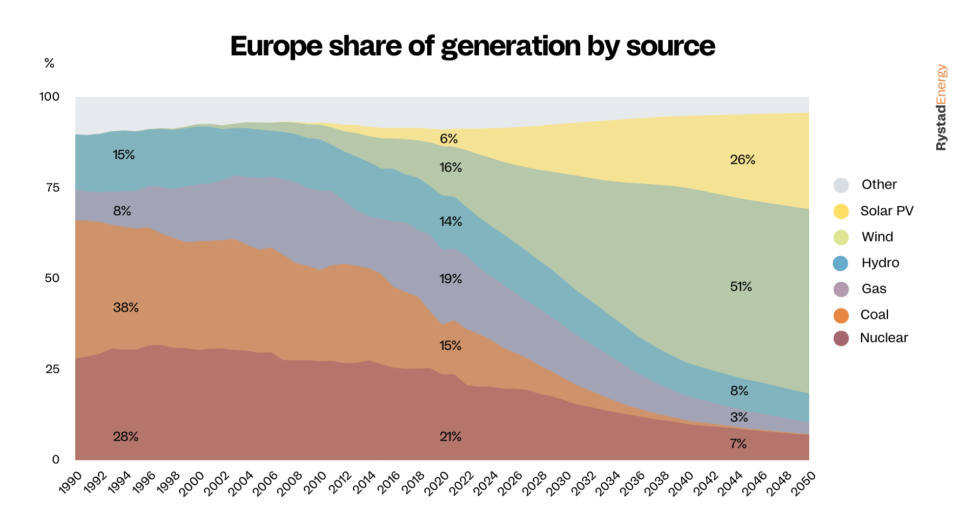Wartsila boss calls for onshore wind to power Europe’s energy ambitions

Onshore wind should “absolutely” be part of Europe’s green ambitions, as the continent looks to overhaul its energy infrastructure to meet net zero goals and reduce its reliance on overseas gas supplies, argued the boss of a leading Finnish power group.
Hakan Agnevall, chief executive of Wartsila, argued that ramping up domestic renewable generation over the decade was essential, and that onshore wind turbines were cheaper and quicker to assemble than offshore wind projects.
He also rejected suggestions green projects would undermine food security in Europe – which has been used as a justification for rejecting new developments across the continent.
Agnevall told City A.M.: “I don’t see that an increased share renewables and an increased land use or renewables will lead to starvation or lack of food.”
The Wartsila boss declined to comment specifically on the UK’s onshore wind sector.
However, the domestic industry has faced continued uncertainty over potential domestic planning reforms to boost the flagging sector.
Former Prime Minister Liz Truss announced proposals in her Growth Plan to bring planning for onshore wind projects into line with other infrastructure developments.
Her replacement Rishi Sunak has not clarified whether he will go through with her reforms.

Last month, he re-imposed the moratorium on fracking after Truss unveiled plans to revive domestic shale gas.
In the leadership race this summer he suggested he would prefer to focus on offshore wind generation rather than battle communities to provide new onshore projects.
Writing in The Telegraph, he said: “Wind energy will be an important part of our strategy, but I want to reassure communities that as Prime Minister I would scrap plans to relax the ban on onshore wind in England, instead focusing on building more turbines offshore.”
Since 2015, onshore wind development has faced a series of planning hurdles which vastly reduced development across the UK – with former Prime Minister David Cameron wanting to move away from ‘green crap.’
This means wind farms have required consent for developments to go ahead – with sites needing to be approved in plans established by residents with local authorities across England.
Currently, only 11 per cent of local authorities across England have designated areas for renewable developments in their plans, according to Dr Rebecca Windemer at the University of the West of England.
Her research reveals the maximum installed capacity of wind farms (in MW) granted planning permission between 2016-2021 is just 2.6 per cent of those granted permission between 2009-2014.
The Government has been approached for comment.
Politics is stopping renewable expansion
Agnevall also recognised that Europe has become highly reliant on deals with overseas vendors to meet its gas needs during the energy criss, which is expected to continue well into next year.
This includes securing vast quantities of the highly carbon intensive liquefied natural gas (LNG) from the US and Qatar.
In his view, this was preferable to further increasing coal consumption, which Wartsila has previously raised concerns over during the energy crisis.
He said: “We need to be realistic people and I think the politicians are really working on this because people don’t want to be cold during the winter. There are investments being made now with LNG terminals, and I think we have to live with it.
“I think that is because we have no other realistic alternatives. We need to accelerate renewables, but it won’t solve the problem in two to three years.”
The European Union (EU) has topped up gas supplies to over 95 per cent of capacity ahead of winter, reducing the likelihood of blackouts.
Gazprom has severely cut flows into the continent, in retaliation to a raft of sanctions from the West following Russia’s invasion of Ukraine.

This increased short-term gas usage had to be married with plans to quickly ramp up renewables including both wind and solar, with Agnevall raising frustrations at the speed of developments across the continent.
He believed it was unlikely Europe will be able to contain global temperature levels to below a 1.5 degree rise from pre-industrial levels, as proposed in the Paris Agreement.
However, the Wartsila boss called on the EU to double wind power installations from 15GW per year to 30GW, urging the continent to tackle planning logjams which are slowing down developments.
This would take renewable generation to around 40 per cent of Europe’s energy mix, from around 32 per cent where it sits today.
He said: “I think this is a political issue. It’s not a technical issue that we need to resolve and I would say the biggest challenge for Europe right now in terms of decarbonising, the energy system is permitting because everybody wants green energy, but not in my backyard.”